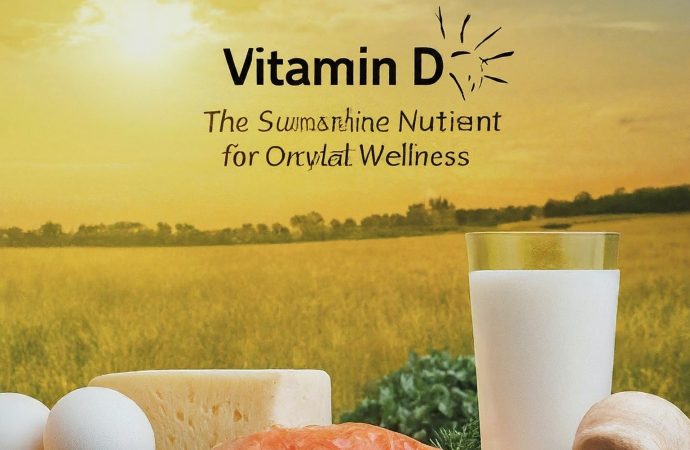Meet Dr. Lisa Davies, Your Guide to Vitamin D Dr. Lisa Davies, a board-certified naturopathic doctor, is passionate about empowering individuals to take charge of their health naturally. Today, she delves into the world of Vitamin D, often called the “sunshine nutrient.” Dr. Davies will explore its incredible impact on your overall well-being. Sunshine on
Meet Dr. Lisa Davies, Your Guide to Vitamin D
Dr. Lisa Davies, a board-certified naturopathic doctor, is passionate about empowering individuals to take charge of their health naturally. Today, she delves into the world of Vitamin D, often called the “sunshine nutrient.” Dr. Davies will explore its incredible impact on your overall well-being.
Sunshine on Your Plate: Understanding Vitamin D
Vitamin D isn’t quite a traditional vitamin. Our bodies can actually produce it when exposed to sunlight! Vitamin D plays a crucial role in calcium absorption, which is essential for strong bones and teeth. But its benefits extend far beyond that.
Beyond Bones: The Diverse Benefits of Vitamin D
Think of Vitamin D as a multi-tasking superhero in your body. Here are some of its impressive feats:
- Immune System Champion: Vitamin D helps regulate your immune system, potentially acting as a shield against infections and autoimmune diseases.
- Muscle Powerhouse: Adequate Vitamin D levels may improve muscle strength and function, reducing the risk of falls, especially in older adults.
- Mood Booster: Studies suggest a link between Vitamin D deficiency and depression. Maintaining healthy Vitamin D levels may contribute to a more positive outlook.
- Overall Health Guardian: Vitamin D may play a role in various bodily functions, potentially impacting heart health, blood pressure regulation, and even diabetes risk.
Are You Getting Enough Sunshine Vitamin? Signs of Deficiency
While our bodies can produce Vitamin D with sunlight exposure, factors like geographical location, skin pigmentation, and use of sunscreen can limit natural production. So, how do you know if you’re getting enough?
Some signs of Vitamin D deficiency include:
- Frequent fatigue and muscle weakness
- Increased susceptibility to infections
- Bone pain or tenderness
- Difficulty concentrating or feeling down
If you’re experiencing any of these symptoms, a simple blood test can determine your Vitamin D levels.
Soak Up the Sun (Safely!): Natural Ways to Boost Vitamin D
The good news is there are ways to optimize your Vitamin D levels naturally!
- Embrace the Morning Sun: Aim for 15-20 minutes of unprotected sun exposure (midday sun is strongest, but morning sun exposure is generally safer) on your face, arms, and legs most days of the week.
- Remember, moderation is key. Excessive sun exposure can increase the risk of sunburn and skin cancer. Always wear sunscreen when outdoors for extended periods.

Picture by: Google Gemini
Dietary Sources: Power Up Your Plate with Vitamin D
While sunlight is a primary source, incorporating Vitamin D-rich foods into your diet can be beneficial:
- Fatty Fish: Salmon, sardines, mackerel, and tuna are excellent sources.
- Egg Yolks: A readily available source with a good amount of Vitamin D.
- Fortified Foods: Many breakfast cereals, milk alternatives, and some mushrooms are fortified with Vitamin D.
Supplements: When Food Isn’t Enough
If dietary sources and sun exposure aren’t sufficient, Vitamin D supplements can be a helpful option. However, it’s important to consult your doctor before starting any supplements, as they can interact with certain medications.
Knowing Your Levels: The Importance of Vitamin D Testing
A simple blood test can measure your Vitamin D levels. Based on the results, your doctor can recommend the best course of action, whether it’s dietary changes, increased sun exposure (with proper safety measures), or a personalized supplementation plan.
Striking a Balance: Vitamin D and Sun Safety
While sunlight is crucial for Vitamin D production, sun safety is paramount. Here are some tips:
- Seek shade during peak sun hours (10 am to 4 pm).
- Wear protective clothing, including a hat and sunglasses.
- Apply broad-spectrum sunscreen with SPF 30 or higher liberally and reapply every two hours, or more often if swimming or sweating.
Remember, a healthy balance is key.
Unlocking Your Sunshine Potential: Dr. Davies’ Final Thoughts
Vitamin D is a powerful nutrient that plays a vital role in your overall health and well-being. By incorporating Dr. Davies’ tips – embracing safe sun exposure, including Vitamin D-rich foods in your diet, and consulting your doctor about testing and supplementation – you can unlock the sunshine potential within you and empower your body to thrive.
















